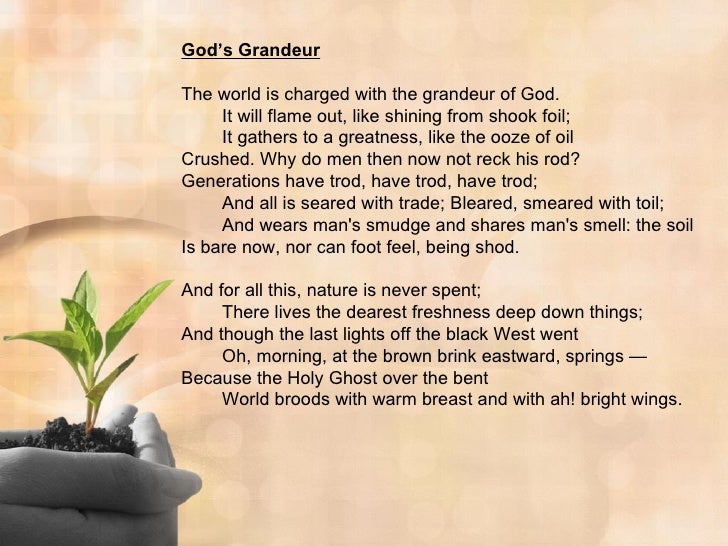Objectives: Watch the video and read the poem "Gods Grandeur"by Gerard Manley Hopkins
2. Answer questions online
Summary
The first four lines of the octave (the first eight-line stanza of an Italian sonnet) describe a natural world through which God’s presence runs like an electrical current, becoming momentarily visible in flashes like the refracted glinting of light produced by metal foil when rumpled or quickly moved.
The first four lines of the octave (the first eight-line stanza of an Italian sonnet) describe a natural world through which God’s presence runs like an electrical current, becoming momentarily visible in flashes like the refracted glinting of light produced by metal foil when rumpled or quickly moved.
Alternatively, God’s presence is a rich oil, a kind of sap that wells up “to a greatness” when tapped with a certain kind of patient pressure. Given these clear, strong proofs of God’s presence in the world, the poet asks how it is that humans fail to heed (“reck”) His divine authority (“his rod”).
The second quatrain within the octave describes the state of contemporary human life—the blind repetitiveness of human labor, and the sordidness and stain of “toil” and “trade.” The landscape in its natural state reflects God as its creator; but industry and the prioritization of the economic over the spiritual have transformed the landscape, and robbed humans of their sensitivity to the those few beauties of nature still left. The shoes people wear sever the physical connection between our feet and the earth they walk on, symbolizing an ever-increasing spiritual alienation from nature.
The sestet (the final six lines of the sonnet, enacting a turn or shift in argument) asserts that, in spite of the fallenness of Hopkins’s contemporary Victorian world, nature does not cease offering up its spiritual indices. Permeating the world is a deep “freshness” that testifies to the continual renewing power of God’s creation. This power of renewal is seen in the way morning always waits on the other side of dark night.
The source of this constant regeneration is the grace of a God who “broods” over a seemingly lifeless world with the patient nurture of a mother hen. This final image is one of God guarding the potential of the world and containing within Himself the power and promise of rebirth. With the final exclamation (“ah! bright wings”) Hopkins suggests both an awed intuition of the beauty of God’s grace, and the joyful suddenness of a hatchling bird emerging out of God’s loving incubation.
Questions based on God’s Grandeur

1. Using your own words, express in about two to three lines the theme of the poem.
2. State the central contrast which this poem presents between God and man.
Explain it fully with reference to specific details.
3. Select one metaphor used in the poem and show how it is expanded.
4. Identify the lines in which the poet expresses:
(a) disgust
(b) hope
5. Explain in your own words the meaning of the following lines:
(a) Why do men now not reck his rod?
(b) And for all this, nature is never spent.
6. The poet uses the following devices. Select one example of each and comment
on its effect:-
(a) Simile
(b) Alliteration
(c) Compression
(d) Repetition
7. State the effectiveness of using any ONE of the above devices.
2. State the central contrast which this poem presents between God and man.
Explain it fully with reference to specific details.
3. Select one metaphor used in the poem and show how it is expanded.
4. Identify the lines in which the poet expresses:
(a) disgust
(b) hope
5. Explain in your own words the meaning of the following lines:
(a) Why do men now not reck his rod?
(b) And for all this, nature is never spent.
6. The poet uses the following devices. Select one example of each and comment
on its effect:-
(a) Simile
(b) Alliteration
(c) Compression
(d) Repetition
7. State the effectiveness of using any ONE of the above devices.

Comments
Post a Comment